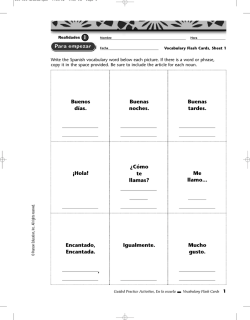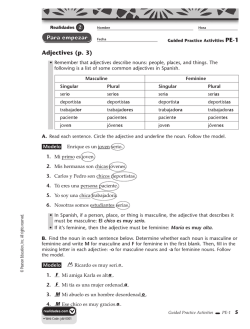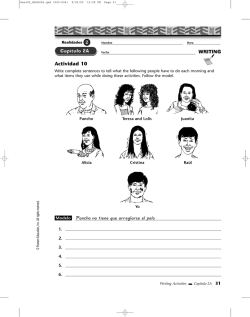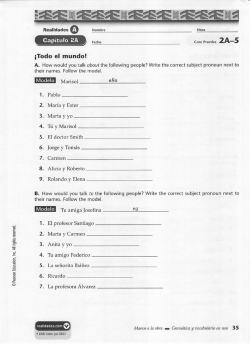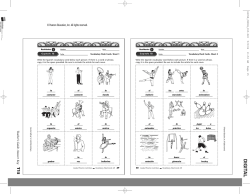
Guided Practice Key
278 Capítulo 4A Realidades Nombre Realidades Hora Fecha AVSR Nombre 4A-1 A ver si recuerdas: Suffixes (p. 183) Guided Practice Answers • To say that something is small or little or to add a feeling of affection to a noun, use the suffix -ito (-a, -os, -as). This is called the diminutive. Generally, you drop the -o, -a, -os, or -as from the end of the noun and add the suffix. perro ➔ perrito novela ➔ novelita Hora Vocabulary Flash Cards, Sheet 1 Fecha Write the Spanish vocabulary word or phrase below each picture. Be sure to include the article for each noun. A. Change these nouns to the diminutive. First, drop the underlined part of the noun. Then, add the appropriate suffix: -ito, -ita, -itos, -itas. Follow the model. Modelo librito libro escuelita 1. escuela 2. hermanos hermanitos el patio gatito de recreo 3. gato 4. abuelo abuelito 5. zapatos zapatitos molestar vasito 6. vaso 7. galletas galletitas 8. regalo regalito • To add emphasis to an adjective (as if adding really in English), use the suffix -ísimo (-a, -os, -as). Remember the written accent over the first “i” of the suffix. Mi amiga es divertida. My friend is fun. Mi amiga es divertidísima. My friend is really fun. la cuerda saltar a la cuerda el tren eléctrico B. Rewrite the descriptions of the people and things in these sentences, using the -ísimo form of the adjective. Follow the model. Modelo Julia es muy inteligente. Es inteligentísima _________________________________________ . 1. La fiesta fue muy buena. _________________________________________ . Fue buenísima 2. Estas piñatas son muy lindas. _________________________________________ . Son lindísimas 3. Los globos son preciosos. _________________________________________ . Son preciosísimos 4. Mi mamá estuvo muy ocupada hoy. _________________________________________ . Estuvo ocupadísima 5. Las fotos son muy graciosas. i\Xc`[X[\j%Zfd _________________________________________ . Son graciosísimas A ver si recuerdas 4A-1 127 la el el muñeca muñeco triciclo 128 Guided Practice Activities © Pearson Education, Inc. All rights reserved. © Pearson Education, Inc. All rights reserved. pelearse Vocabulary Flash Cards 4A • Web Code: jdd-0401 REL211se_VG_GP04_127-144.indd 1 2/5/09 11:17:09 AM REL211se_VG_GP04_127-144.indd 2 2/5/09 11:17:10 AM © Pearson Education, Inc. All rights reserved. © Pearson Education, Inc. All rights reserved. Realidades Nombre Realidades Hora Nombre Vocabulary Flash Cards, Sheet 2 Fecha Write the Spanish vocabulary word below each picture. If there is a word or phrase, copy it in the space provided. Be sure to include the article for each noun. Hora Vocabulary Flash Cards, Sheet 3 Fecha Copy the word or phrase in the space provided. Be sure to include the article for each noun. Guided Practice Answers obedecer mentir obedecer ofrecer permitir por lo general infantil ofrecer permitir general de niño, de niña todo el mundo de pequeño, de pequeña la verdad el oso el el de peluche dinosaurio pez la la tortuga moneda la de en vez cuando guardería el los de niño vecino bloques de niña 279 Guided Practice Activities REL211se_VG_GP04_127-144.indd 3 mentir Vocabulary Flash Cards 4A por todo , el 129 2/5/09 11:17:12 AM mundo 130 Guided Practice Activities REL211se_VG_GP04_127-144.indd 4 de pequeño de pequeña , lo © Pearson Education, Inc. All rights reserved. Capítulo 4A © Pearson Education, Inc. All rights reserved. de vez en cuando la verdad Vocabulary Flash Cards 4A 2/5/09 11:17:15 AM 280 Capítulo 4A Realidades Nombre Realidades Hora Vocabulary Flash Cards, Sheet 4 Fecha Copy the word or phrase in the space provided. Be sure to include the article for each noun. Guided Practice Answers consentido, consentida consentido consentida obediente desobediente generoso, generosa desobediente generosa tímido, tímida travieso, traviesa generoso , , travieso tímida traviesa coleccionar el mundo portarse bien/mal el portarse coleccionar mundo bien/mal Guided Practice Activities REL211se_VG_GP04_127-144.indd 5 Vocabulary Flash Cards 4A Hora Vocabulary Flash Cards, Sheet 5 Fecha These blank cards can be used to write and practice other Spanish vocabulary for the chapter. , , © Pearson Education, Inc. All rights reserved. © Pearson Education, Inc. All rights reserved. tímido obediente Nombre 131 2/5/09 11:17:16 AM 132 Guided Practice Activities REL211se_VG_GP04_127-144.indd 6 Vocabulary Flash Cards 4A 2/5/09 11:17:17 AM © Pearson Education, Inc. All rights reserved. © Pearson Education, Inc. All rights reserved. Realidades Nombre Realidades Hora Vocabulary Check, Sheet 1 Fecha Vocabulary Check, Sheet 2 Fecha Tear out this page. Write the Spanish words on the lines. Fold the paper along the dotted line to see the correct answers so you can check your work. blocks blocks los bloques la colección collection collection la colección la cuerda rope rope la cuerda el dinosaurio dinosaur dinosaur el dinosaurio la muñeca doll doll la muñeca el muñeco action figure action figure el muñeco el oso de peluche teddy bear teddy bear el oso de peluche el tren eléctrico electric train electric train el tren eléctrico el triciclo tricycle tricycle el triciclo el pez fish fish el pez la tortuga turtle turtle la tortuga la guardería infantil daycare center daycare center la guardería infantil el patio de recreo playground playground el patio de recreo el vecino, la vecina neighbor neighbor el vecino, la vecina 281 REL211se_VG_GP04_127-144.indd 7 Vocabulary Check 4A Fold In Fold In Guided Practice Answers los bloques Guided Practice Activities Hora © Pearson Education, Inc. All rights reserved. Capítulo 4A © Pearson Education, Inc. All rights reserved. Tear out this page. Write the English words on the lines. Fold the paper along the dotted line to see the correct answers so you can check your work. Nombre 133 2/5/09 11:17:17 AM 134 Guided Practice Activities REL211se_VG_GP04_127-144.indd 8 Vocabulary Check 4A 2/5/09 11:17:18 AM 282 Capítulo 4A Realidades Nombre Realidades Hora Vocabulary Check, Sheet 3 Fecha Tear out this page. Write the English words on the lines. Fold the paper along the dotted line to see the correct answers so you can check your work. Nombre Hora Vocabulary Check, Sheet 4 Fecha Tear out this page. Write the Spanish words on the lines. Fold the paper along the dotted line to see the correct answers so you can check your work. to collect to collect coleccionar molestar to bother to bother molestar pelearse to fight to fight pelearse saltar (a la cuerda) to jump (rope) to jump (rope) saltar (a la cuerda) mentir to lie to lie mentir obedecer to obey to obey obedecer permitir to permit, to allow to permit, to allow permitir portarse bien/mal to behave well/badly to behave well/badly portarse bien/mal de niño, de niña as a child as a child de niño, de niña de vez en cuando once in a while once in a while de vez en cuando © Pearson Education, Inc. All rights reserved. © Pearson Education, Inc. All rights reserved. Guided Practice Answers coleccionar REL211se_VG_GP04_127-144.indd 9 Vocabulary Check 4A 135 2/5/09 11:17:19 AM 136 Guided Practice Activities REL211se_VG_GP04_127-144.indd 10 Fold In Fold In Guided Practice Activities To hear a complete list of the vocabulary for this chapter, go to www.realidades.com and type in the Web Code jdd-0489. Then click on Repaso del capítulo. Vocabulary Check 4A 2/5/09 11:17:20 AM © Pearson Education, Inc. All rights reserved. © Pearson Education, Inc. All rights reserved. Realidades Nombre Realidades Hora Fecha Guided Practice Activities 4A-1 The imperfect tense: Regular verbs (p. 194) jugar hacer vivir jugaba jugabas jugaba jugábamos jugabais jugaban hacía hacías hacía hacíamos hacíais hacían vivía vivías vivía vivíamos vivíais vivían • Note the accents on jugábamos and throughout the conjugations of the -er and -ir verbs. • These expressions can cue you to use the imperfect: generalmente, por lo general, a menudo, muchas veces, de vez en cuando, todos los días, nunca. A. Write the infinitive form of each conjugated verb. The first one is done for you. 2. molestaba molestar Guided Practice Answers © Pearson Education, Inc. All rights reserved. 3. coleccionaban coleccionar 4. obedecías obedecer Fecha Guided Practice Activities 4A-2 5. ofrecía ofrecer 6. permitían permitir 7. corríamos correr 8. vivíamos vivir C. Write the correct endings for the -er and -ir verbs below. Follow the model. Modelo Por lo general, yo obedec ía 1. Mis primos me ofrec ían a mis padres. sus bloques de vez en cuando. 2. A menudo mis tíos me permit ían 3. Generalmente, mamá pon ía comer una galletas. la mesa. 4. Mis hermanos y yo hac íamos la cama todos los días. 5. Tú viv ías en la misma ciudad que yo. D. Complete the sentences below to describe what people used to do. Use the drawings and the verbs in parentheses as clues. Follow the model. Modelo saltaba Mario 1. coleccionaban Ellos (coleccionar) 2. Ellas a la cuerda. (saltar) dinosaurios en la escuela primaria. B. Fill in the blanks with the correct form of the -ar verbs in the imperfect tense. Follow the model. Modelo Tú habl abas con mucha gente. 1. Alicia siempre molest aba nada a nosotros. 3. jugábamos Nosotros al tenis los domingos. (jugar) bien enfrente de mis padres. 5. A menudo nosotros jug ábamos en el parque. 4. 283 Guided Practice Activities 4A-1 137 Tú 138 Guided Practice Activities • Web Code: jdd-0404 REL211se_VG_GP04_127-144.indd 11 todos los días. (pelearse) agua al perro muchas veces. 4. Yo siempre me port aba i\Xc`[X[\j%Zfd peleaban a su hermana. 2. Mis tíos nunca nos regal aban 3. Pedro le d aba se © Pearson Education, Inc. All rights reserved. Capítulo 4A jugar 1. jugaba Hora The imperfect tense: regular verbs (continued) • The imperfect tense is used to talk about actions that happened repeatedly in the past. Rafael caminaba y Ramiro corría en el parque. Rafael used to walk and Ramiro used to run in the park. • Here are the regular forms of -ar, -er, and -ir verbs in the imperfect tense: yo tú usted/él/ella nosotros/nosotras vosotros/vosotras ustedes/ellos/ellas Nombre leías 4A-2 en la biblioteca los fines de semana. (leer) i\Xc`[X[\j%Zfd • Web Code: jdd-0404 2/5/09 11:17:21 AM REL211se_VG_GP04_127-144.indd 12 2/5/09 11:17:22 AM 284 Capítulo 4A Realidades Nombre Realidades Hora Fecha Guided Practice Activities 4A-3 The imperfect tense: irregular verbs (p. 196) Hora Fecha Guided Practice Activities 4A-3a The imperfect tense: review • There are only three irregular verbs in the imperfect tense: ir, ser, and ver. Here are their forms: Guided Practice Answers yo tú usted/él/ella nosotros/nosotras vosotros/vosotras ustedes/ellos/ellas Nombre ir ser ver iba ibas iba íbamos ibais iban era eras era éramos erais eran veía veías veía veíamos veíais veían • Note that only the nosotros forms of ir and ser carry accents. • Ver uses the exact same endings as regular -er verbs, and is only irregular because of the added “e”. A. Below are two paragraphs about Christopher Columbus. As you read, fill in the blanks with the appropriate imperfect form of the verbs given. The first one has been done for you. tenía Cuando Cristóbal Colón (tener) diez años, le gustaba (gustar) mucho navegar (to sail) con su papá. Cristóbal y sus amigos imaginaban iban ellos (imaginar) lugares distantes y exóticos que (ir) a visitar algún día. Sus padres siempre decían (decir): “Es importante imaginar y descubrir (discover)”. pensaba Cristóbal (pensar) mucho y realmente quería (querer) buscar un lugar nuevo. A. Choose the correct verb in parentheses to complete each sentence. Circle your choice. Use the chart above to help you. Follow the model. Modelo Clara y Nubia ( eran / iban ) mis amigas. 1. Por lo general, yo ( era / veía ) a mis primas. 2. Mis primos nunca ( veían / iban ) conmigo al mercado. 3. Mis hermanos y yo ( éramos / íbamos ) muy traviesos. B. Complete the following sentences using the imperfect form of the verb in parentheses. Follow the model. Modelo Nosotros (ir) 1. ¡Mi mamá (ser) íbamos era 2. Nosotros generalmente (ver) 3. De niña, yo (ir) iba 4. La familia de mi mamá (ver) 5. Juana y yo (ser) éramos a la escuela todos los días. Cuando muy traviesa de niña! veíamos la tele en casa. eras a la casa de mis tíos de vez en cuando. veía era (ser) mayor, él hablaba (hablar) de vez en cuando con los reyes (kings, rulers) de España para pedirles dinero decían para sus exploraciones. Los reyes (decir): “ Cristóbal, tú (ser) un buen explorador de niño con tu padre. Tú veías a la abuela durante las vacaciones. muy buenas amigas. (ver) muchos lugares nuevos. Es importante ahora exploraba descubrir una nueva ruta a la India”. Cristóbal siempre veía (explorar) y (ver) muchos lugares nuevos, pero nunca © Pearson Education, Inc. All rights reserved. © Pearson Education, Inc. All rights reserved. 4. ¿Tú ( ibas / veías ) muchas películas? encontró la ruta a la India. i\Xc`[X[\j%Zfd Guided Practice Activities 4A-3 139 140 Guided Practice Activities • Web Code: jdd-0405 REL211se_VG_GP04_127-144.indd 13 4A-3a i\Xc`[X[\j%Zfd • Web Code: jdd-0405 2/5/09 11:17:24 AM REL211se_VG_GP04_127-144.indd 14 2/5/09 11:17:25 AM © Pearson Education, Inc. All rights reserved. © Pearson Education, Inc. All rights reserved. Realidades Nombre Fecha Realidades Hora Guided Practice Activities 4A-4 Indirect object pronouns (p. 199) Singular Plural Fecha Guided Practice Activities 4A-4a me (to/for) me nos (to/for) us C. Look at each of the following sentences. First, underline the indirect object noun. Then, in the space provided, put the indirect object pronoun that corresponds to the noun you underlined. Follow the model. Modelo Nuestros padres siempre 1. Por lo general, mis amigos 2. Los abuelos de Alicia siempre 3. La profesora te 4. Yo no 5. Tío Leo te (to/for) you (familiar) os (to/for) you (familiar) le (to/for) him, her, you (formal) les (to/for) them, you (formal) A. Circle the indirect object pronoun in each sentence. Follow the model. les nos me decían la verdad a nosotros. prestaban a mí sus juguetes. le querían dar a ella buenas cosas. permitía a los estudiantes jugar en el patio de recreo. daba dinero a ti para ver las películas. le compraba a mi hermano las vías (tracks) para su tren eléctrico. • Indirect object pronouns can be placed before the verb or attached to the infinitive. Mi abuela nunca me quería dar dinero en mi cumpleaños. Mi abuela nunca quería darme dinero en mi cumpleaños. Tú le escribías cartas a tu amigo boliviano Carlos. D. Look at the sentences below and write a new sentence with the same meaning, placing the indirect object pronoun differently. Follow the model. 2. Mi abuela me daba muchos besos. Modelo Tía Lisa me quería llevar a la guardería infantil. Tía Lisa quería llevarme a la guardería infantil . 1. Yo no les podía mentir a mis padres. 4. Claudia nos iba a comprar ropa. Yo no podía mentirles a mis padres __________________________________________________________________________ . 5. Roberto les ofrecía el triciclo a sus hermanas. Guided Practice Answers B. Circle the appropriate indirect object pronoun in parentheses to complete each sentence. Then, underline the part of the sentence that indicates to whom the pronoun refers. The first one is done for you. 2. Los tíos siempre nos tenían que decir que éramos niños traviesos. Los tíos siempre tenían que decirnos que éramos niños traviesos __________________________________________________________________________ . 3. Mis primos malos siempre me querían molestar. 1. Generalmente mi abuela ( nos / me ) compraba muchos juguetes a nosotros. Mis primos malos siempre querían molestarme __________________________________________________________________________ . 2. Mamá y yo siempre ( le / nos ) dábamos tarjetas bonitas a la tía. 4. A veces mis hermanos y yo no les queríamos obedecer a nuestros padres. 3. Yo ( te / le ) ofrecía dulces a ti en la escuela primaria. © Pearson Education, Inc. All rights reserved. Capítulo 4A 1. Yo le pedía a mamá una muñeca. 3. Carlos y yo le ofrecíamos unos chocolates. © Pearson Education, Inc. All rights reserved. Hora Indirect object pronouns (continued ) • An indirect object tells to whom or for whom something is done. Julio escribió una carta a Susana. Julio wrote a letter to Susana. • Indirect object pronouns can replace an indirect object. Julio le escribió una carta. Julio wrote her a letter. • Indirect object pronouns, especially le and les, can also be used with an indirect object. Julio le escribió una carta a Susana. Julio wrote a letter to Susana (to her). • Here are the forms of the indirect object pronouns: Modelo Nombre A veces mis hermanos y yo no queríamos obedecerles a nuestros padres __________________________________________________________________________ . 4. Tú siempre ( les / te ) dabas osos de peluche a mis hermanas. 5. Mis padres no ( me / les ) permitían a mí llevar gorra a la iglesia. 285 i\Xc`[X[\j%Zfd Guided Practice Activities 4A-4 141 142 Guided Practice Activities • Web Code: jdd-0406 REL211se_VG_GP04_127-144.indd 141 4A-4a i\Xc`[X[\j%Zfd • Web Code: jdd-0406 2/17/09 6:14:27 PM REL211se_VG_GP04_127-144.indd 16 2/5/09 11:17:28 AM 286 Capítulo 4A Realidades Nombre Fecha Realidades Hora Guided Practice Activities 4A-5 Lectura: El grillo y el jaguar (pp. 202–203) Guided Practice Activities 4A-6 Task: Describe what you were like when you were a small child and draw a series of pictures that illustrate your sentences. Guided Practice Answers A. The reading in your textbook is a fable from Mexico. Look at the title of the reading and the pictures. Then, using the fables you know as guides, like Aesop’s Fables, list three things that you think might happen in this fable. Answers will vary. A. Think about what you were like when you were a small child, what things you used to do, and what things you weren’t allowed to do. Then, complete the following sentences. 1. Cuando era niño(a), era Answers will vary. y . 2. 2. Yo jugaba con . 3. 3. Me gustaba jugar . 4. Yo tenía que . 5. Mis padres no me permitían . B. In the following paragraph from the reading, the jaguar challenges the cricket to a race. Read the paragraph and then circle the option below that describes what you think will happen. Answers will vary. —Vamos a hacer una carrera (race) hasta aquella roca enorme que está por donde empiezan las montañas. Si llegas primero, te perdono todo y puedes seguir cantando, pero si llego primero yo, te prohíbo cantar. B. On a separate sheet of paper, make a drawing or cut out pictures from a magazine to illustrate each of your sentences from part A. Number your pictures 1 to 5. C. Use your sentences from part A and your drawings from part B to prepare your presentation. You can practice your presentation with a partner. Make sure that: 1. The cricket wins the race and can continue singing. 2. The jaguar wins the race and the cricket can’t sing. • your sentences describe the pictures in order • you use complete sentences • you speak clearly so that you can be understood C. After you have read El grillo y el jaguar, write the letter of the answer that best completes each sentence. 1. Los personajes principales (main characters) de esta fábula son: a. el grillo y el jaguar b. el jaguar y el jardín c. el grillo y el lago a D. Now, talk about what you were like when you were a child. Hold up your pictures in order during the presentation as you say your sentences to describe them. You can follow the model. Cuando era niño(a), yo era obediente. Yo jugaba con mis amigos. Me gustaba jugar con mi triciclo. Yo tenía que portarme bien. Mis padres no me permitían saltar en la cama. c 2. El problema de esta fábula es: a. El grillo quiere correr tan rápidamente como el jaguar. b. El jaguar quiere cantar. c. Al jaguar no le gusta la canción del grillo. E. Your teacher will probably grade you on the following: c 3. La moraleja (moral) de esta fábula es: a. El grillo gana porque corre más rápidamente. b. El grillo gana porque el jaguar es simpático. c. El grillo gana porque es más inteligente. i\Xc`[X[\j%Zfd • the amount of information you communicate • how easy it is to understand you • the quality of visuals Guided Practice Activities 4A-5 143 144 Guided Practice Activities © Pearson Education, Inc. All rights reserved. © Pearson Education, Inc. All rights reserved. Fecha Hora Presentación oral (p. 205) Making predictions is a useful strategy to help prepare you for a reading. 1. Nombre 4A-6 • Web Code: jdd-0407 REL211se_VG_GP04_127-144.indd 17 2/5/09 11:17:29 AM REL211se_VG_GP04_127-144.indd 18 2/5/09 11:17:30 AM © Pearson Education, Inc. All rights reserved.
© Copyright 2026
